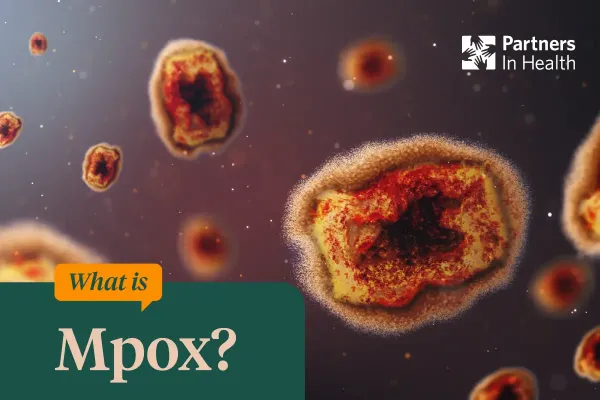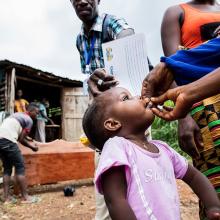The increasing spread of an infectious disease is making headlines again.
Mpox (previously called monkeypox), a viral disease known for rashes and lesions on the skin, has led to more than 15,600 cases and 537 deaths in the Democratic Republic of Congo alone in 2024. Additional cases were reported in 12 other African countries, including Rwanda and Liberia—where Partners In Health (PIH) works. This is the first time a case was reported in Rwanda.
On August 14, the World Health Organization declared a global health emergency due to the rise in mpox cases and new virus strain. A previous mpox outbreak in 2022, which was also declared a global health emergency, led to nearly 100,000 cases and 208 deaths across 116 countries.
Most patients recover on their own, after two to four weeks; but the drastic increase in cases is sounding alarms worldwide and spurring calls for global vaccination. Treatments and vaccines can control an mpox outbreak; however, they remain widely unavailable across Africa.
Here are seven things to know about the disease:
1. What are the signs and symptoms of mpox?
Symptoms usually include a fever, severe headache, muscle aches, back pain, low energy, swollen lymph nodes, and skin rashes or lesions. The rash usually begins within one to three days of the fever.
The lesions may be flat or slightly raised and filled with clear or yellowish fluid. Eventually, the lesions dry, scab, and fall off. Rashes tend to occur on the face, palms of the hands, and soles of the feet, but may also be found on the mouth, genitals, and eyes.
Symptoms usually last two to four weeks.
2. How is mpox transmitted?
Human-to-human transmission can occur through contact with the skin lesions of an infected person, mucus or saliva, or contaminated objects. It typically requires skin-to-skin contact.
Animal-to-human transmission occurs through direct contact with the blood, body fluids, skin lesions, or mucous membranes of infected animals. The animals that host this virus are often rodents or primates.
3. Is mpox a new disease?
Mpox is not a new disease. The virus has been considered endemic in 12 countries on the African continent for decades. But it has also previously occurred in the United States—the first outbreak in the U.S. was reported in 2003, spreading from prairie dogs to humans and affecting six states.
The current outbreak is causing concern due to its fast spread and new virus strain. But mpox is not nearly as contagious or as deadly as COVID-19. Unlike the coronavirus, mpox typically requires close physical contact with someone who is infected.
4. Is mpox fatal?
It can be fatal. In most cases, symptoms often resolve within a few weeks on their own, without treatment.
In some people, the virus can lead to medical complications. These complications—such as pneumonia or infections in the brain or eyes—can be fatal.
Newborns, children, and immuno-compromised people are most at risk for severe symptoms.
5. Is there a cure?
The U.S. has two vaccines approved for use, as prevention measures, and recently announced plans to donate 50,000 doses to the Democratic Republic of Congo, a country with a population of nearly 100 million people as of 2022. More vaccines and treatment are needed to effectively control the spread.
6. Who is most at risk of catching mpox?
During the 2022 mpox outbreak, men who have sex with men comprised the vast majority of new cases. However, susceptibility to the disease is not limited to people who are sexually active or to men who have sex with men.
Anyone can catch mpox. The current outbreak has mostly impacted children under 15 in the Democratic Republic of Congo.
It is vital to fight not only the spread of the virus, but also the spread of misinformation and stigma, which only further endangers marginalized groups, including LGBTQ+ people and Black people.
7. How can I stay safe?
The World Health Organization recommends that men who have sex with men consider limiting their number of sexual partners to lower their risk of infection and reduce transmission.
The WHO also recommends avoiding skin-to-skin contact whenever possible, washing your hands regularly with soap or using hand sanitizer, and washing clothes, sheets, towels, and other items or surfaces that have been potentially exposed.
If you think you have symptoms, please isolate at home until you can be evaluated by a doctor.
Mpox testing is now widely available in the United States. If you have been in direct contact with someone infected, or have been at an event or location with a known mpox outbreak, please be on the lookout for symptoms, and consider getting vaccinated for mpox immediately.
For more information, visit the World Health Organization.


